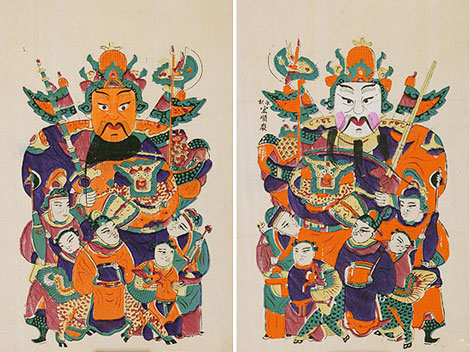Door-God is a Chinese decoration placed on each side of an entry to a temple, home, business, etc., which is believed to keep evil spirits from entering. This custom dates back to the Tang Dynasty, whose founder Emperor Tang Taizong (599—649AD) honored two of his most loyal generals – Qin Shubao and Yuchi Jingde by having their painted portraits hung on his front door. Ordinary families soon adopted the imperial custom, putting woodblock prints of the ever-vigilant generals on their front gates in the hope of attracting good luck and fending off evil spirits. The Door-God business soon spread throughout China, adding other folklore heroes and mythological figures to the repertoire.

Door-God Qin Shubao and Yuchi Gong Spring Festival Paintings by Tantou
Paper
Length: 36cm; Height: 57cm
Handmade Spring Festival’s woodblock paintings made by Tantou, Shaoyang, Hunan Province
The door gods usually come in pairs, facing each other; it is considered bad luck to place the figures back-to-back. There are several different forms of door gods, among which Qin Shubao and Yuchi Gong (used on a pair of doors) are the most frequently used.
Red-orange, purple and green are applied to this painting, among which, red symbolizes liveliness, happiness and warmth, purple stands for brightness and highness, and the green implies life and growth. Therefore, the overall effect of this painting “Door-God” is of security, warmth, festivity and vitality.





